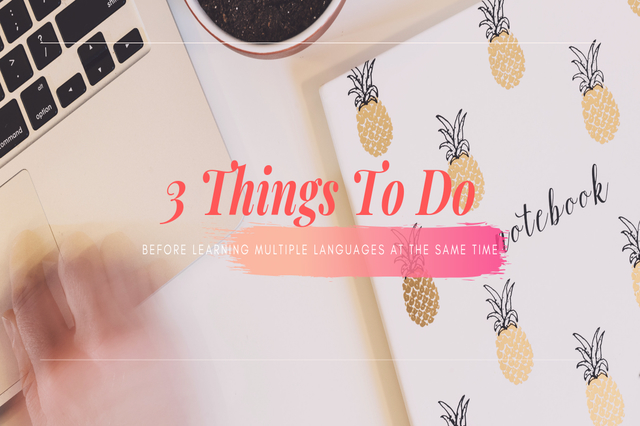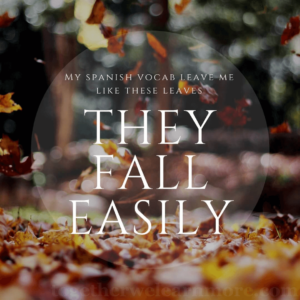
If you plan on learning multiple languages at the same time and wondering if it’s possible, the answer is yes. You might want to read this post first because there are a few things you should take into account.
This is how I learn two and sometimes three languages at the same time without getting burned out.
Before you start asking questions such as is this suitable for newbies, the learner’s background (age) and the purpose which I’ve decided to include after reading Daniela Forgáčová’s comment, here it is.
I’m a female in my 20s. The purpose of learning the languages (except English and Arabic) is for fun and out of curiosity.
Well, it did start that way but changed halfway because I realized I really wanted to be able to hold conversations with native speakers (Spanish, for now). So, my target is upper intermediate (B2) and then move on to the others while still maintaining it.
I include an element of entertainment in my learning process since that’s the main reason I embarked on this language-learning journey in the first place.
For English, 60% entertainment (where I learn to mimic the pronunciation, intonation, and accent), 30% speaking, and 10% grammar. I’ve been learning English since primary but my interest only started in high school.
For Spanish, 40% entertainment (where I learn to mimic the pronunciation, intonation, and accent), 40% repetition, 10% speaking, and 10% grammar. I’ve been learning it for 3 years (self-taught).
I’m fully aware that constant speaking practice is the most effective but, in my case, I rely heavily on entertainment because from there the desire of wanting to improve my speaking skills grows naturally, not forcefully.
Whenever I feel like procrastination hits me, I always go back to entertainment. By doing that, my motivation is up again. The only con I could think of is I find myself pausing and repeating certain scenes just to mimic the P, I, A.
It can be tiring but totally worth it.
I decided to choose a slow but effective method. These percentages (except for entertainment) might slightly change from time to time.
This is my way of reducing stress and burnout and still manage to keep my motivation going. Some may think it’s the lazy way, but I assure you I do it diligently simply because it is fun, doable and achievable.
Now, let’s move on to the few things you should know before you start your own journey.
Key mindset: Be patient, flexible, and realistic. Learning two or three languages at once is possible, but you’ll likely go slower than if you focused on just one.
When learning a new language, many parts of our brains are activated, requiring much more effort than simply memorizing formulas. – Brainscape
I’m currently learning Spanish and Italian. In order for me to learn both effectively, I set realistic goals for each and I don’t give the same amount of attention to these two.
Spanish – Since it’s my main target language, I focus more on that. My goal is to keep reviewing the grammar topic and vocabulary as I learn new ones.
Italian – I just want to have a good understanding of the basic Ripeti Con Me lessons. I decided to continue learning it even after I’ve finished reviewing the course since it’s pretty similar to Spanish and I feel like it would be a waste to stop.
Even though the attention rate is not the same I make sure to learn both every day (Donnovan Nagel suggests the opposite) no matter how easy or difficult the lesson is. I feel comfortable this way because of two reasons.

Once you’ve decided, set a doable schedule and follow it religiously. When you’ve been doing language learning for so long, you’ll get to know your good habits and bad habits.
Some never have problems, even with learning very similar languages. Some can't do it at all, no matter how distinct the languages are. Most are somewhere in between. - pseudocreobotra
I’ve been reading some language learning blogs regarding this topic and I found 2 different thoughts. Whether you’re learning two different languages or two languages from the same family the answer is still not recommended.
The main reason is:-
You might not get the best result out of it compared to learning just one at a time due to many reasons. If you really want to seriously learn two languages at the same time, Brainscape has a good post on how to learn them the right way.
You have to get to an intermediate level first or get a good grasp of the first language before you start on the second one.
It might lead to confusion. You’re going to mix up one thing with the other. However, a few people in the language-learning community have the opposite thought.
They recommend learning them together because it might help ease the learning process due to their similarity. I emphasize the ease part because that’s as far you can get and it won’t guarantee you’ll learn faster.
And yes, you’ll experience the confusion part as well but I believe once you know the difference you’ll do just fine.
That’s what happens to me with Italian perché/ per favore and Spanish por qué/ por favor. The Spanish pronunciation always comes out automatically whenever I say the Italian version. It’s unavoidable, especially in the beginning.
I agree with the latter opinion because the only reason I was (and I still am) able to learn two languages at the same time is literally because of the above reason.
If you’ve been following my blog you know that learning two languages at once is very common to me and in my country.
There was a time I learned both English and Arabic (during high school and university), Spanish and German, Spanish and Thai, and Spanish and Italian.
The reason it’s doable is because I’ve been learning English and Spanish for quite a while, so adding another language to it isn’t a problem.
Language learning is a skill that can be developed - FluentU
The good thing about learning two languages at the same time is you can experiment with them. You can either use the same method that you’re using in one language or use a different method.
Experimenting is fun. You may want to rethink this if the timing isn’t right for you. If that’s the case you might want to read this (the best way to learn a language). Find out which one works best regardless of whether you’re a newbie or an advanced learner.
Never rely on just one method, diversify it.
It always surprises me whenever I do this because as much as I hate going out of my comfort zone, I know that I have to try everything to actually enjoy and make the process less stressful.
If before you think learning through cartoons like a child would isn’t effective you might actually change your perspective.
It might take longer for two languages than one, and you might need to get a little creative about how you approach it. But if you’re committed, consistent, and passionate about studying both languages, then you will succeed. – Benny Lewis
I agree with the above statement. You can read as many blogs as you want and agree or disagree with them but at the end of the day, it boils down to you, your goals, time and preference.

Who cares if your method is weird and uncommon?
You’re the one who’s doing it and you know what works best. Just remember, what works for others might not work with you and vice versa.
That’s all that matters.
When you speak more than one language, it is easier to learn another. And another, and another. – Alex Hammond
English is my second language. When I decided to learn Spanish, I had no doubt it would be difficult. But as I started learning I realized there were some familiar words with English and Tagalog.
You have no idea how happy I was because I didn’t know these languages were going to help me in the process (in terms of vocabulary) and that at some point I can’t really say I was learning it from scratch. Grammar, on the other hand, is a different scenario.
The same thing with Italian. Before learning it, I read on some blogs saying that it was similar to Spanish but I didn’t know how similar it was until I began.
It turns out every language I decided to learn is actually related to one another and I have to admit it’s a big help to me though not significantly. As I said above, knowing some cognate words won’t help you shorten the learning process.

Share with us your know-how of learning multiple languages at the same time. Or if you plan to do that, how are you going to do so? Others might get inspired by it.
©2025 Together We Learn More
©2025 Together We Learn More
jarilissima says:
Good stuff! I chose mine based on being constantly exposed to it (Korean) and ease of learning by what I already know (Italian, already know Spanish). Happy learning!
Meina says:
Hi, jarilissima! Being constantly exposed to the target language is great. How long have you been learning Korean? Do you follow K-entertainment regularly then (dramas, movies, songs)? How’s your progress so far? Is Spanish your native language? If not, what is it?
Anyway, thanks for dropping by.